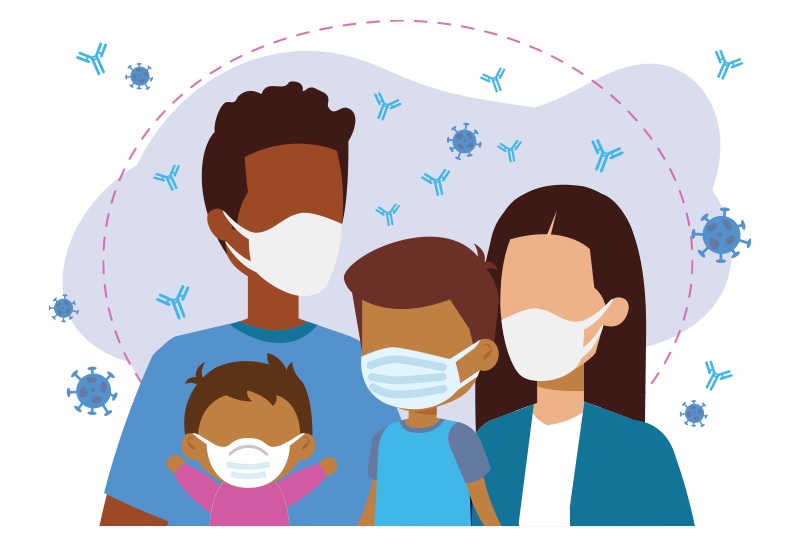Previous COVID-19 or MIS-C does not protect kids from Omicron

You would think that having had COVID-19 once, you’d have antibodies that would protect you against repeat infections. But studies of adults have shown that Omicron doesn’t go by that logic. A new study, led by Dr. Adrienne Randolph of Boston Children’s Hospital and Dr. Surender Khurana of the Food and Drug Administration, confirms that the same is true for children.
“I hear parents say, “Oh, my kid had COVID last year,” Dr. Randolph says. “But we found that antibodies children produced during prior infections don’t neutralize Omicron. This means that unvaccinated children are still susceptible to Omicron.”
Loss of antibody protection
The study drew on Overcoming COVID-19, a nationwide study involving 70 children’s hospitals which Dr. Randolph launched in 2020. Some data also came from Boston Children’s Taking On COVID-19 Together Group.
The researchers studied blood samples from children and adolescents who had COVID-19 or multisystem inflammatory syndrome in children (MIS-C) during 2020 and early 2021, before Omicron emerged. Of these, 62 had been hospitalized with severe COVID-19 and 65 with MIS-C; another 50 children had recovered from mild COVID-19 and hadn’t been hospitalized.
In the laboratory, the team exposed the children’s blood samples to a pseudovirus, which is derived from the SARS-CoV-2 coronavirus, but stripped of its virulence. They then measured how well antibodies in the samples were able to neutralize five different variants of concern: Alpha, Beta, Gamma, Delta, and Omicron.
Overall, children and adolescents showed some loss of antibody neutralization against later-emerging variants. But the loss was most pronounced for Omicron: fewer than 10 percent had sufficient neutralizing antibodies to fight it off.
“Omicron is very different from previous variants,” Dr. Randolph says. “It has many mutations on the spike protein, and we now know that this enables it to evade the antibody response.”
Vaccination offers better protection than prior COVID-19 or MIS-C
When the researchers looked at the children’s history of vaccination, they found that those who had received two doses of COVID-19 vaccine had higher levels of neutralizing antibodies against all five variants, including Omicron.
“With the emergence of Omicron, vaccination offers children and teens better protection against COVID-19,” Dr. Randolph says.
She hopes these findings will encourage parents to get their children and teens vaccinated. According to data from the CDC, only 29 percent of 5- to 11-year-olds and 59 percent of 12- to 17-year-olds had received two vaccine doses as of May 25, 2022. (An FDA panel will meet on June 15 to consider authorization of COVID-19 vaccines for children under age 5.)
One limitation of the study was that it was only able to test for antibody responses, not other measures of immunity such as production of T cells. But these are much harder to test for, so researchers rely on antibody tests to understand people’s level of immunity.
The findings were published in Nature Communications on May 27. Juanjie Tang, PhD, of the FDA and Tanya Novak, PhD, of Boston Children’s Hospital were co-first authors on the paper.
Explore COVID-19 research at Boston Children’s Hospital
Related Posts :
-

A new symptom of COVID-19 in young children: Croup
During the Omicron surge, pediatricians and emergency departments (EDs) began noticing something new: a surge in croup among infants and ...
-

Pregnant mothers who get COVID-19 vaccines are also protecting their babies
Recent studies have shown that COVID-19 vaccination is safe for expectant mothers and can protect them against infection, severe illness, ...
-

COVID vaccination in 5- to 11-year-olds: What does the science say?
The Pfizer–BioNTech COVID-19 vaccine was approved for children ages 5 to 11 in October, but many parents have been hesitant to ...
-

COVID-19 vaccination in 12- to 18-year-olds: What does the science say?
With a third “booster” dose of the Pfizer/BioNTech vaccine now authorized for children age 12 and older, you may be ...





